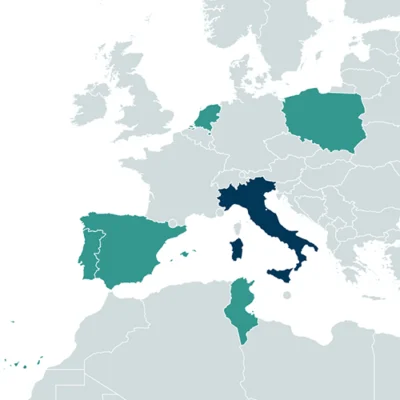Salty symphonies: bringing back BiodivErsity in mArginal Saltlands
Call
Duration
01/02/2025 – 31/01/2028
Total grant
Approx. 1.2 mil. €
More information
Nadia Bazihizina, nadia.bazihizina@unifi.it
Partners of the project
- Department of Biology, University of Florence, Florence, Italy
- Laboratory of Extremophile Plants, Center of Biotechnology of Borj Cédria, Hammam Lif, Tunisia
- Centre of Marine Sciences, Faro, Portugal
- Department of Microbiology, Nicolaus Copernicus University, Toruń, Poland
- Institute for Environmental Studies, Stichting VU, Amsterdam, Netherlands
- Plant Breeding Department, Spanish National Research Council, Murcia, Spain
- Department of Agriculture, Food and Environment, University of Pisa, Pisa, Italy
- Manouba School of Engineering, University of Manouba, Tunis, Tunisia

Context
Soil salinization is a global issue that affects agricultural productivity, environmental health, and economic well-being. The rising rates of soil salinization, compounded by climate change and population growth, intensify the pressure on fertile lands. Therefore, developing strategies to extend/maintain crop production in salt-affected areas is essential for ensuring the future of agriculture and global food security. To effectively address this challenge, and meet climate, biodiversity, and food security goals, it is essential to develop sustainable management practices tailored to these demanding environments.
SaltyBEATS addresses this challenge by focusing on the critical yet overlooked issue of multitaxon biodiversity collapse in salt-affected lands. By studying naturally saline ecosystems, the project aims to use halophytes to develop innovative strategies to enhance plant genetic and functional biodiversity in marginal lands. SaltyBEATS will also evaluate how this increased biodiversity benefits crop production and ecosystem health.
Main objectives
SaltyBEATS aims to revitalise marginal salt-affected lands by understanding the role of halophytes in naturally saline landscapes and use this knowledge to deliver practical solutions to restore their biodiversity and improve their resilience. Specifically SaltyBEATS will:
- map and assess biodiversity in naturally saline habitats to explore time-dependent changes in halophyte diversity and richness, assessing their role in shaping plant-plant, plant-insects and plant-microbiome interactions;
- identify endangered/threatened halophytes and develop in vitro cultivation and multiplication methods for their conservation and introduction in marginal lands;
- identify indicators, accessible to all, for land capability assessment and ecosystem services quantification in salt-affected areas;
- evaluate the synergistic effects derived from stacking halophytes with conventional crops and assess the impact of this increased ecological complexity;
- design future scenarios to assess synergy effects and trade-offs of saline agriculture as a NbS for marginal areas and determine how it will become relevant for farmers in different regions in the context of climate change;
- identify stakeholder needs and create a link between policy makers and impact investors to upscale SaltyBEATS results.
Main activities
SaltyBEATS will combine participatory research, field demonstrations, workshops, and stakeholder consultations to develop new management practices locally attuned to specific cropping systems, soils and climatic conditions. By co-creating a narrative around the importance of halophytes and biodiversity conservation both in naturally-saline areas and in marginal salt-affected lands, SaltyBEATS will:
- boost public awareness and appreciation of these naturally saline areas, a key step in preserving these ecosystems and the specialised species that inhabit them; and
- create a synergy effect with involved stakeholders to promote the upscaling of a nature-positive agriculture that aligns ecological and economic targets.